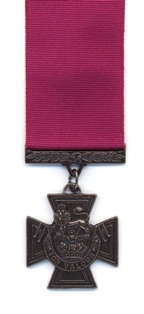The Gazette hall of fame: Charles Allix Lavington Yate

Major Charles Allix Lavington Yate was one of the first soldiers to win the Victoria Cross. It was awarded for his bravery at Le Cateau, France, on 26 August 1914.
Born in Germany on 14 March 1872, Charles Allix Lavington Yate, or ‘Cal’ to his friends, was the son of Reverend Prebendary George Edward Yate and Louise Caroline Yate, George’s second wife, who was of German origin.
Educated at Weymouth College until 1890, Yate graduated from Sandhurst with top honours and joined the King’s Own Yorkshire Light Infantry. He was promoted to the rank of lieutenant on 12 August 1892 (Gazette issue 26316) and was sent to India.
Yate first saw action on the North-West Frontier, for which he was later awarded the India Service Medal. In 1899, he was made a captain and was posted to South Africa to serve in the Boer War. After being badly wounded at the Battle of Graspan, he was sent back to England to recover.
In 1903, he married Florence Burroughs. Soon after the wedding, he was sent to Japan as a member of the British army to report on military tactics used by the Japanese in their war against Russia. At the end of this war, in 1905, Yate was awarded 2 medals by the Japanese emperor – the Russo-Japanese War Medal and the Japanese Order of the Sacred Treasure.
Historians claim that it was during his time with the Japanese army that he absorbed elements of Japanese culture. Later events suggest that Captain Yate felt very strongly that a soldier should never be taken alive on the field of battle.
On his return from Japan, Captain Yate served on the general staff in South Africa and in London at the War Office. In 1912, he was promoted to the rank of major, and following the outbreak of war, travelled to France as part of the commanding staff of the King’s Own Yorkshire Light Infantry. It was at the Battle of Le Cateau on 26 August 1914 for which he was to receive the Victoria Cross.
During the battle, Major Yate’s company, among others, was not ordered to retire in time. Surrounded by the advancing German army, Yate’s company held their position until there were just 19 men left unwounded. After several hours of fighting, Yate and his men ran out of ammunition, and he led the survivors in a bayonet charge against the attacking German infantry.
Yate was captured, along with his surviving men, and interned in a prisoner of war camp in Torgau, Germany. After several failed attempts, he finally escaped on 19 September 1914. However, he was cornered and questioned by suspicious German civilians, who demanded to see the contents of his rucksack. Rather than allow himself to be uncovered as a British soldier and be captured and returned to prison, he took his own life on the spot with a razorblade.
There has been much speculation over why Yate did this. Perhaps he had been interviewed by German intelligence while a prisoner and believed them to suspect him of being a peacetime spy in Germany. Or maybe his time in Japan had influenced him to take on the belief that surrender was worse than death for a soldier. Regardless of his reasoning, Yate’s death was announced in The Gazette’s citation for his Victoria Cross (Gazette issue 12744).
